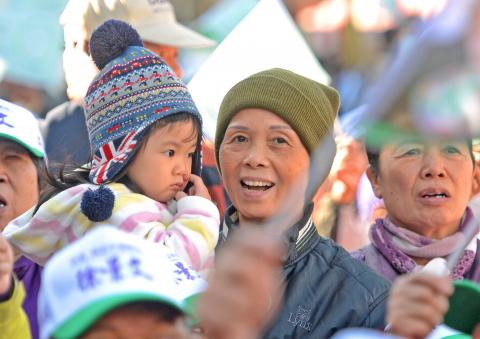Democratic Progressive Party (DPP) presidential candidate Tsai Ing-wen (蔡英文) yesterday called on the Chinese Nationalist Party (KMT) to stop selling its controversial party assets, questioning whether it is doing so to avoid supervision from the next legislature.
“The public should take this seriously. The KMT is trying to sell off its party assets before the legislative and presidential elections,” Tsai said in response to media queries while attending a campaign rally for the party’s legislative candidate in Taoyuan’s Jhongli District (中壢).
“I suspect that [the KMT] is selling the party assets with the intention of avoiding examination and supervision of the new legislature after the election and therefore I call on KMT Chairman Eric Chu (朱立倫) to refrain from selling party assets prior to the election of the new legislature and the passage of legislation on political parties and party assets,” she said.

Photo: CNA
Tsai was referring to advertisements published by the Chinese-language Commercial Times earlier this week that called for buyers for 26 plots owned by the KMT — three in Taipei, six in Taichung and 17 in Changhua — and for 80 percent of the shares of a hotel in Palau.
Tsai asked KMT presidential candidate Chu to clearly explain the funding of his and KMT legislative candidates’ campaigns, as the DPP did.
Chu should explain whether KMT assets have been used to fund election campaigns and how much has been invested so that voters have a basis for comparison between the two parties, Tsai said.
Speaking about the scheduled presidential debates, Tsai said she is glad the three parties have finally reached an agreement on the dates.
The presidential and vice presidential candidates’ debates have been scheduled with the first debate to take place on Saturday next week, the second on Dec. 27 and the third on Jan. 2.
“There will be three debates, and we are happy to have this opportunity to present our policies to voters around the nation,” Tsai said.
Tsai said that her aides would be working closely with debate organizers, while she and her team would be making their final preparations for the debates, adding that she has canceled some public appearances to prepare.
Tsai has been campaigning in Taoyuan and said that the situation is relatively more stable in southern Taiwan, so she would focus on regions where the support is relatively weaker, such as Taoyuan, Hsinchu, Miaoli and New Taipei City.
As for Jhougli, which has traditionally been a stronghold for the KMT, Tsai said that the support for the two parties is 50/50 and called on the voters to give the DPP a chance.

The Ministry of Economic Affairs has fined Taobao NT$1.2 million (US$36,912) for advertisements that exceed its approved business scope, requiring the Chinese e-commerce platform to make corrections in the first half of this year or its license may be revoked. Lawmakers have called for stricter enforcement of Chinese e-commerce platforms and measures to prevent China from laundering its goods through Taiwan in response to US President Donald Trump’s heavy tariffs on China. The Legislative Yuan’s Finance Committee met today to discuss policies to prevent China from dumping goods in Taiwan, inviting government agencies to report. Democratic Progressive Party Legislator Kuo Kuo-wen (郭國文) said

The Ministry of Economic Affairs has fined Taobao NT$1.2 million (US$36,900) for advertisements that exceeded its approved business scope and ordered the Chinese e-commerce platform to make corrections in the first half of this year or its license would be revoked. Lawmakers have called for stricter supervision of Chinese e-commerce platforms and more stringent measures to prevent China from laundering its goods through Taiwan as US President Donald Trump’s administration cracks down on origin laundering. The legislature’s Finance Committee yesterday met to discuss policies to prevent China from dumping goods in Taiwan, inviting government agencies to report on the matter. Democratic Progressive Party

Taiwan and its Pacific ally Tuvalu on Tuesday signed two accords aimed at facilitating bilateral cooperation on labor affairs, according to Taiwan’s Ministry of Foreign Affairs (MOFA). The governments inked two agreements in Taipei, witnessed by Foreign Minister Lin Chia-lung (林佳龍) and visiting Deputy Tuvaluan Prime Minister Panapasi Nelesone, MOFA said in a news release. According to MOFA, the agreements will facilitate cooperation on labor issues and allow the two sides to mutually recognize seafarers’ certificates and related training. Taiwan would also continue to collaborate with Tuvalu across various fields to promote economic prosperity as well as the well-being of their

Sung Chien-liang (宋建樑), who led efforts to recall Democratic Progressive Party (DPP) Legislator Lee Kun-cheng (李坤城), was released on bail of NT$80,000 today amid outcry over his decision to wear a Nazi armband to questioning the night before. Sung arrived at the New Taipei District Prosecutors’ Office for questioning in a recall petition forgery case last night wearing a red armband bearing a swastika, carrying a copy of Adolf Hitler’s Mein Kampf and giving a Nazi salute. Sung left the building at 1:15am without the armband and covering the book with his coat. Lee said today that this is a serious